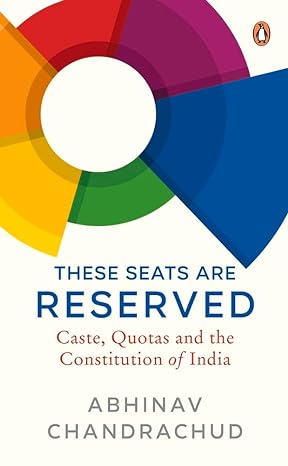These Seats Are Reserved
The word Reservation generates some strong opinions in India. There is a long on-going debate on the subject. Both end of the spectrum, the supporters and opposers of reservation have some strong and logical arguments in their favours. However, I feel that generally, we don’t fully understand reservation, its purpose, and its utility. I firmly believe that we should know the basic framework of reservation, why it was started, when it was started, and how it is implemented to understand it better.
The book “These Seats Are Reserved”, takes a deep dive into the subject. The author starts with finding the origin and evolution of the word depressed class. When it was used first and for whom it was used. The evolution of nomenclature from depressed class to scheduled caste (SC) and scheduled tribes (ST) and later other backward classes (OBC). There are some interesting anecdotes about various leaders and their views about reservations.
“Though Prime Minister Nehru was in favour of improving the social and economic condition of backward classes in India, he seemed to be against reservations. He felt that there was no point in reserving seats for backward classes in government jobs at the cost of efficiency.”
The book delves deep into the Constitutional debates on reservations. It takes us through what was discussed in the constituent assembly. In the first draft of the Constitution, there was reservation only in legislative bodies and government jobs.
There was no reservation for Rajya Sabha, ministries, judiciary, municipal corporations, or educational institutions. The reservations policy as we see it today is a result of long discussions and debates by our Constitution makers. Should the reservation be provided to only “untouchables”, or should tribal people also be covered under reservation? Does reservation violate the principle of ‘equality of opportunity’? The debate over merit and efficiency. There were many questions like this that the constitution makers had to face.
The author meticulously covers the journey of reservation; the various legal challenges it faced and how it evolved over the years. The book draws attention to the technicalities involved in deciding who qualifies for reservation. We would see that to use reservations in jobs and educational institutions people made false claims about their caste. How the court dealt with such cases and what legal safeguards were put in place to avoid happening this in the future.
The book explains in detail how reserved seats are calculated, this part of the book becomes too technical and heavy. But if you are interested in the subject or if you are a research student, this book will come in handy. The author also points out various challenges in filling the reserved seats in government jobs. The reasons could be technicalities, shortage of qualified people from reserved categories, and sometimes just bias of upper caste people. As one member of the Lok Sabha pointed out on why reserved seats were not being filled in government jobs.
“Many government officials preferred to hire temporary (or ‘ad-hoc’) employees from the forward communities to do the jobs reserved for backward classes. Further, even when backward-class candidates were selected for jobs, they would be prevented from joining their posts in several ways: e.g., they would be sent their appointment letters late, so that they could not join on time; they would be declared medically unfit, though they would be perfectly fit for the job; or they would be posted to remote areas which are akin to ‘mental torture’”.
The book is well-researched and well-written providing the readers with all the information about reservations and how they came into being. How the reservations stand in their present form and whether it is only benefiting a few select among the reserved categories. The provides the readers with constitutional and legal aspects of the reservation policy; the socio-economic conditions of reserved categories after seventy years of independence and reservation policy.
A must-read book for all who want to enhance their understanding of reservation policy and how it works. This book is about what the Constitution says about reservations and how our courts have defined it whenever the policy of reservation is challenged by some individual or gourps.
About The Author
Abhinav Chandrachud is an advocate who practises at the Bombay High Court. He graduated from the LL.M. program at Harvard Law School where he was a Dana Scholar, and from the JSM and JSD programs at Stanford Law School where he was a Franklin Family Scholar.
